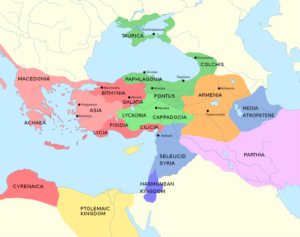“From Peter, an apostle of Jesus Christ. To God’s chosen people who are temporary residents in the world and are scattered throughout the provinces of Pontus, Galatia, Cappadocia, Asia, and Bithynia” (1 Peter 1:1 GW).
 The list of provinces given to us here in 1 Peter 1:1 may offer a clue regarding the first-century distribution of this letter. For instance, a courier who was tasked with the responsibility to deliver this epistle might begin in the northern region of Pontus and then proceed in a clockwise direction through the remaining provinces in the order given to us here. As the letter carrier traveled through these regional areas, each group of recipients had an opportunity to copy this letter for later reference before sending the messenger on his way to the next destination.
The list of provinces given to us here in 1 Peter 1:1 may offer a clue regarding the first-century distribution of this letter. For instance, a courier who was tasked with the responsibility to deliver this epistle might begin in the northern region of Pontus and then proceed in a clockwise direction through the remaining provinces in the order given to us here. As the letter carrier traveled through these regional areas, each group of recipients had an opportunity to copy this letter for later reference before sending the messenger on his way to the next destination.
It is also interesting to note that three of these locations are specifically mentioned in Acts chapter two. That portion of Scripture records the events that transpired on the day of Pentecost following Jesus’ ascension. It was during that time when the residents of these areas (along with several others) heard the magnificent works of God declared in their native languages through the power of the Holy Spirit.
Peter then followed with a dynamic sermon that made a significant impact upon those who heard it…
“Now when they heard this, they were cut to the heart, and said to Peter and the rest of the apostles, ‘Men and brethren, what shall we do?’ Then Peter said to them, ‘Repent, and let every one of you be baptized in the name of Jesus Christ for the remission of sins; and you shall receive the gift of the Holy Spirit. For the promise is to you and to your children, and to all who are afar off, as many as the Lord our God will call” (Acts 4:37-39).
In light of this, we can say that Peter’s ministry had now come full circle. Even though the members of his audience were now dispersed abroad, this letter served to continue his work among those he first addressed in Acts chapter two. In addition, Paul the Apostle had also conducted several evangelistic tours through these regions. Thus, it seems that God was willing to make a significant investment in the spiritual lives of these regional populations through the work of these prominent Apostles.
Those investments should also prompt us to consider the investment that God is making in us today through the ministry of His Word and encourage us to make the best use of that investment in our daily lives.
Image Credit: Ilya Yakubovich, CC BY-SA 4.0, via Wikimedia Commons

